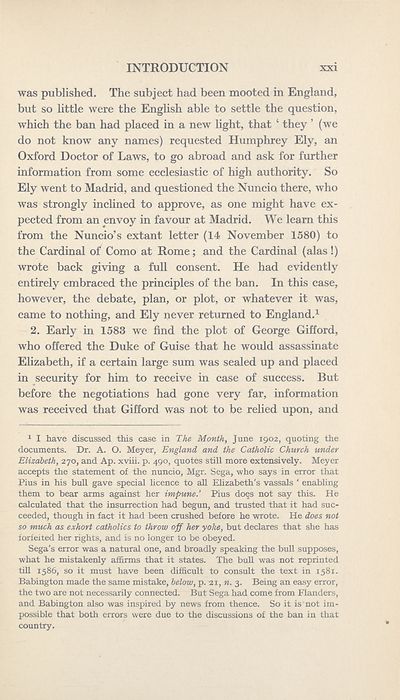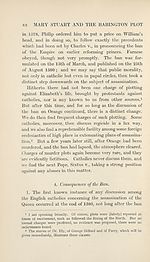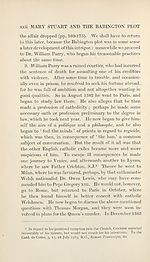Series 3 > Mary Queen of Scots and the Babington plot
(26) Page xxi
Download files
Complete book:
Individual page:
Thumbnail gallery: Grid view | List view

INTRODUCTION
xxi
was published. The subject had been mooted in England,
but so little were the English able to settle the question,
which the ban had placed in a new light, that ‘ they ’ (we
do not know any names) requested Humphrey Ely, an
Oxford Doctor of Laws, to go abroad and ask for further
information from some ecclesiastic of high authority. So
Ely went to Madrid, and questioned the Nuncio there, who
was strongly inclined to approve, as one might have ex¬
pected from an envoy in favour at Madrid. We learn this
from the Nuncio’s extant letter (14 November 1580) to
the Cardinal of Como at Rome; and the Cardinal (alas!)
wrote back giving a full consent. He had evidently
entirely embraced the principles of the ban. In this case,
however, the debate, plan, or plot, or whatever it was,
came to nothing, and Ely never returned to England.1
2. Early in 1583 we find the plot of George Gifford,
who offered the Duke of Guise that he would assassinate
Elizabeth, if a certain large sum was sealed up and placed
in security for him to receive in case of success. But
before the negotiations had gone very far, information
was received that Gifford was not to be relied upon, and
1 I have discussed this case in The Month, June 1902, quoting the
documents. Dr. A. O. Meyer, England and the Catholic Church under
Elizabeth, 270, and Ap. xviii. p. 490, quotes still more extensively. Meyer
accepts the statement of the nuncio. Mgr. Sega, who says in error that
Pius in his bull gave special licence to all Elizabeth’s vassals ‘ enabling
them to bear arms against her impune.’ Pius does not say this. He
calculated that the insurrection had begun, and trusted that it had suc¬
ceeded, though in fact it had been crushed before he wrote. He does not
so much as exhort catholics to throw off her yoke, but declares that she has
forfeited her rights, and is no longer to be obeyed.
Sega’s error was a natural one, and broadly speaking the bull supposes,
what he mistakenly affirms that it states. The bull was not reprinted
till 1586, so it must have been difficult to consult the text in 1581.
Babington made the same mistake, below, p. 21, n. 3. Being an easy error,
the two are not necessarily connected. But Sega had come from Flanders,
and Babington also was inspired by news from thence. So it is not im¬
possible that both errors were due to the discussions of the ban in that
country.
xxi
was published. The subject had been mooted in England,
but so little were the English able to settle the question,
which the ban had placed in a new light, that ‘ they ’ (we
do not know any names) requested Humphrey Ely, an
Oxford Doctor of Laws, to go abroad and ask for further
information from some ecclesiastic of high authority. So
Ely went to Madrid, and questioned the Nuncio there, who
was strongly inclined to approve, as one might have ex¬
pected from an envoy in favour at Madrid. We learn this
from the Nuncio’s extant letter (14 November 1580) to
the Cardinal of Como at Rome; and the Cardinal (alas!)
wrote back giving a full consent. He had evidently
entirely embraced the principles of the ban. In this case,
however, the debate, plan, or plot, or whatever it was,
came to nothing, and Ely never returned to England.1
2. Early in 1583 we find the plot of George Gifford,
who offered the Duke of Guise that he would assassinate
Elizabeth, if a certain large sum was sealed up and placed
in security for him to receive in case of success. But
before the negotiations had gone very far, information
was received that Gifford was not to be relied upon, and
1 I have discussed this case in The Month, June 1902, quoting the
documents. Dr. A. O. Meyer, England and the Catholic Church under
Elizabeth, 270, and Ap. xviii. p. 490, quotes still more extensively. Meyer
accepts the statement of the nuncio. Mgr. Sega, who says in error that
Pius in his bull gave special licence to all Elizabeth’s vassals ‘ enabling
them to bear arms against her impune.’ Pius does not say this. He
calculated that the insurrection had begun, and trusted that it had suc¬
ceeded, though in fact it had been crushed before he wrote. He does not
so much as exhort catholics to throw off her yoke, but declares that she has
forfeited her rights, and is no longer to be obeyed.
Sega’s error was a natural one, and broadly speaking the bull supposes,
what he mistakenly affirms that it states. The bull was not reprinted
till 1586, so it must have been difficult to consult the text in 1581.
Babington made the same mistake, below, p. 21, n. 3. Being an easy error,
the two are not necessarily connected. But Sega had come from Flanders,
and Babington also was inspired by news from thence. So it is not im¬
possible that both errors were due to the discussions of the ban in that
country.
Set display mode to:
![]() Universal Viewer |
Universal Viewer | ![]() Mirador |
Large image | Transcription
Mirador |
Large image | Transcription
Images and transcriptions on this page, including medium image downloads, may be used under the Creative Commons Attribution 4.0 International Licence unless otherwise stated. ![]()
| Scottish History Society volumes > Series 3 > Mary Queen of Scots and the Babington plot > (26) Page xxi |
|---|
| Permanent URL | https://digital.nls.uk/127234353 |
|---|
| Attribution and copyright: |
|
|---|
| Description | Over 180 volumes, published by the Scottish History Society, containing original sources on Scotland's history and people. With a wide range of subjects, the books collectively cover all periods from the 12th to 20th centuries, and reflect changing trends in Scottish history. Sources are accompanied by scholarly interpretation, references and bibliographies. Volumes are usually published annually, and more digitised volumes will be added as they become available. |
|---|


